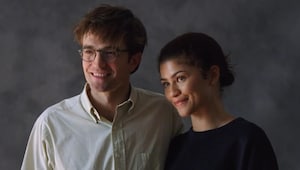What is ‘67’ and how it did it go from internet slang to word of the year?
Yup, this number is officially Dictionary.com's Word of the Year. And mind you, it's six seven, not sixty seven.

At this point, I think Gen Z has collectively reached a state of slang exhaustion. Every few weeks, the internet spits out a new word that sounds like it was generated by a toddler mashing a keyboard, and somehow we are all just supposed to get it. We have survived the “delulu” era, pretended to understand what “NPC energy” meant, and even learnt to use “rizz” in our day-to-day language, ironically. But now? Dictionary.com’s Word of the Year is ‘six seven.’ Not sixty-seven, six seven. Two separate numbers that sound more like a locker combination or a grammatical error. And, somewhere, Shakespeare is weeping into his quill, and honestly? I might join him.
But, as ridiculous as it might sound, six-seven actually makes perfect sense. It’s not really a word per se, it’s a tone, a verbal shrug. Originating from the song ‘Doot Doot’ (6 7) by Skrilla, which later on became popular throughout fan-cam video edits of basketball players, means everything and nothing all at once, like saying “yeah…kinda?” without actually committing to an opinion. It’s honestly peak internet energy, vague, ironic, and completely unserious. Being immortalised by Dictionary.com just proves that we have entered a new era of language, one where words don’t really have to make sense, as long as they feel right.
Psychologists might call it emotional protection. But, for most people online, it's a way to stay sane. When every word you post online can be taken out of context or screen-captured, sincerity starts to feel risky. Irony becomes a survival tool for most as it ends up being the perfect armour for one, casual, funny, yet safe. This shift isn’t new; it’s part of a larger generational pattern. For younger audiences, detachment has become a kind of emotional currency. Being too earnest feels uncomfortable; being vague feels relatable. “Six seven” captures that balance: detached enough to be cool, but real enough to connect. It’s a language born from hyper-connectivity, from growing up in a world that never stops demanding reactions, takes, and feelings.
So yes, maybe it’s absurd that two random numbers have become a linguistic phenomenon. But maybe that’s exactly what makes it so fitting. Because the internet didn’t just change how we communicate, it changed what communication means. “Six seven” is, in a way, a reflection of our times: fluid, uncertain, and self-aware enough to laugh about it.
Lead Image: Netflix
Also Read: Meet soft blocking—the new low-drama breakup trend that Gen Z swears by
Also Read: ChatGPT has became everyone’s emotional support system—and no one’s admitting it
more from Life

Sip, flirt, repeat: Inside New Delhi’s most discreetly delicious cocktail bar

Is 'Bridgerton' season 4 saving its juiciest drama for Part 2?

The rise of ‘I want it all’ culture and why Gen Z means it differently

NAAR and Quintonil: Bringing a taste of Mexico to the Himalayas

This Worli café is all about comfort, caffeine, and slow sips

Elie Saab brings couture-inspired luxury residences to India

Not a drill: the plot of the third 'Game Changers' book about Ilya and Shane just dropped!

What we know about 'The Drama', the Zendaya–Robert Pattinson film that’s keeping its cards close

Sorry, not sorry—over-apologising is holding you back and here’s how to fix it

The 75 hotter fitness challenge proves you don’t need burnout to build better habits
